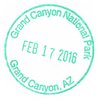 Grand Canyon, Arizona, a National Park since 1919, is home to one of the best-known natural landmarks in the world. There is no way to adequately describe how seeing such a marvel for the first time literally takes your breath away.
Grand Canyon, Arizona, a National Park since 1919, is home to one of the best-known natural landmarks in the world. There is no way to adequately describe how seeing such a marvel for the first time literally takes your breath away.
Visitor Rating (write your own review below)
Awesome Place!
ILNP Rating![]()
Scenery![]()
Uniqueness![]()
Wildlife![]()
ILNP Park Review
In a Word. “Immense”
“And these are but the outer fringe of His works; how faint the whisper we hear of Him! Who then can understand the thunder of His power?” -Job 26:14
Our Visit. We’ve been to Grand Canyon three times. The first time, we visited the North Rim, the less densely traveled side, of the Grand Canyon during June for half a day. This was part of a week-long trip to Zion and Bryce Canyon, so the North Rim made more sense for us than the more popular south rim. The second time, we spent another half a day visiting the South Rim during March as part of an 8-Park Southwest tour. The third trip was another half a day at the south rim as part of a stay in Sedona, Arizona in February.
Our Weather. In July, our weather was partly cloudy with a little bit of rain in the evening. The temperatures were about what you’d expect for July in Arizona, just below 100. Both trips in late winter had temperatures in the 60s and a decent bit of wind making us glad we brought jackets.
Overall Impression. The Grand Canyon is just something you have to see at least once in your life. After all, it is one of the Seven Natural Wonders of the World. I’d seen it from the air a few times and thought it wouldn’t be all that spectacular from the ground. Boy, was I WRONG! The first thing that struck me was all the TREES! Yes, on both sides (particularly the north side) you have to drive through dense forest all the way up to the rim. Once you hike out onto a point surrounded by canyon, you can’t help but be absolutely awestruck by the enormity of everything.
Favorite Spot. Bright Angel Point
Minimum Time Required. For the South Rim, you’ll need at least one hour. This is just enough time to drive to the nearest overlook to the East Entrance (either Desert View or Canyon View) or the South Entrance (Mather Point) and peer over the rim for a few minutes. This is not enough time to enjoy the park, but even 10 minutes looking into the canyon is work the park entry fee if you’ve never seen it before.
For the North Rim, you’ll need at least 90 minutes. If all you want is to walk to the edge and take a few happy snaps with the camera, we’d recommend driving to Bright Angel Point where the visitor’s center is. Once there, a 30 minute hike will get you to a couple of points where you’re surrounded on three sides by several-thousand-foot dropoffs into the canyon. You won’t see the river from here, though, so don’t be disappointed!
A Longer Visit. For a 1/2 day or more on the South Rim, pick a few overlooks rather than trying to stop at each one. For our drive from the East Entrance, we chose Grandview Point, Moran Point, Lipan Point and Desert View. From the South Entrance, we chose Mather Point, Maricopa Point and Pima Point. If you’re near the Grand Canyon Visitor Center and surrounding points, hike along the Rim Trail for a half mile or so to get away from the crowds at the points and see the canyon from a different perspective.
If you have a full day, the Grand Canyon has an extensive bus system on the South Rim, and for some of the most popular spots like Yaki Point, it’s the only way to get there besides hiking. The bus to Hermit’s Rest is seasonal, so if you want to drive the westernmost portion of the road on the South Rim yourself, you’ll need to go in the winter (1 Dec – 28 Feb as of this writing). Our favorite point on this road was Pima Point which is a great place to watch the sunset with a 270 degree view.
With a full day, we also recommend taking either the Kaibab Trail (North or South Rim) or Bright Angel Trail (South Rim) down into the canyon. Traveling the entire trail is a strenuous, multi-day undertaking, but even a two-hour out-and-back hike would take you well below the canyon rim to experience a very different perspective.
If you really want to experience the Grand Canyon, you can plan ahead and take a mule to the bottom or go whitewater rafting on the Colorado River.
For a full day on the North Rim, there are several points you can drive to. Bright Angel Point is still the best place to start. To get different views, drive to Cape Royal stopping at Imperial Point and other overlooks along the way. The overlooks on the North Rim are less crowded, and some, like Cape Royal, have nice, easy hikes associated with them.
Suggestions. Take sunscreen and water–the rim is a few thousand feet above sea-level, so you’ll burn quicker and need more fluid. Know your weather and dress in layers, but don’t be afraid of a little rain, especially if you want more interesting photos of the canyon. Speaking of photos, you really have to experience a sunrise or sunset at the canyon to have a full appreciation of its ruggedness and beauty.
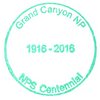 If you want the touristy stuff and amenities, go to the South Rim. If you want fewer crowds, go north (not open in the winter). Even in February, it was tough to find a parking spot at the main Visitor Center and some of the overlooks on the South Rim.
If you want the touristy stuff and amenities, go to the South Rim. If you want fewer crowds, go north (not open in the winter). Even in February, it was tough to find a parking spot at the main Visitor Center and some of the overlooks on the South Rim.
On the South Rim, Grand Canyon Village is really a small town, so expect a bit of traffic. We were pleasantly surprised that the market in the village is good sized, well stocked, and not terribly overpriced.
Nearby Towns Tusayan, Cameron, Fredonia, Kanab, Williams, Flagstaff (Arizona)
Other Nearby Attractions Sunset Crater Volcano NM, Wupatki NM
Official NPS Website Grand Canyon NP
- Setting sun illuminating the far wall of the canyon near Vista Encantada (June)
- Cape Point Royal on the North rim (June)
- Sunset from Yavapai Point. While this may look similar to the phot from Cape Point Royal above, it was taken from the other rim 10 months later (March)
- Yet another colorful vista on the South Rim, near Moran Point (March)
- The South Rim is amazing as well. The late afternoon sun adds contrast and drama to the canyon (March)
- Plaza in front of the Grand Canyon Visitor Center (February)
- The path to Mather Point from the visitor center is broad and easy to hike (February)
- The view from Mather Point looking north (February)
- My favorite picture from the February trip was this one taken just before sunset looking east at Pima Point (February)
- My second favorite picture from the February trip was this image taken in the area known as The Abyss just after sunset (February)
- Rim Trail offers many unique vistas along the South Rim (February)
- Bright Angel Point on the North Rim (June)
- Think the Grand Canyon area is in a desert? Think again! There are meadows and forests with wildlife on both sides. This is the North Rim (June)
- Lipan Point on the South Rim (March)
- Looking out at Mather Point in the afternoon (February)
- The Rim Trail is paved, and taking it gets you away from some of the crowds (March)
- Looking northwest from Pima Point just before sunset(February)
Write Your Own Review


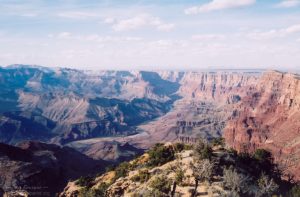
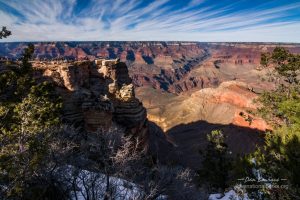
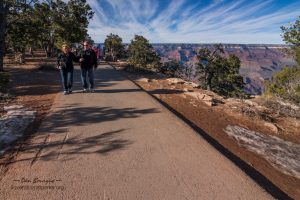
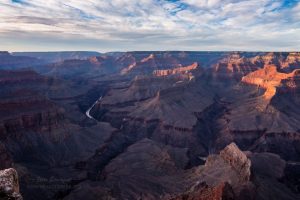
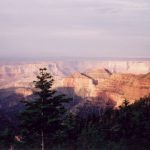
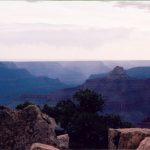
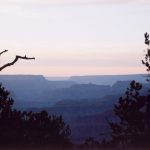
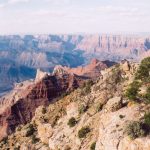
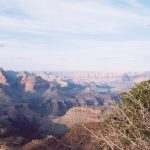
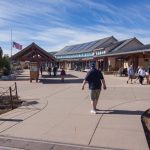
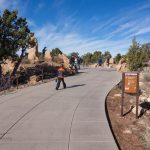
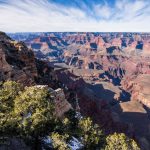
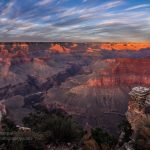
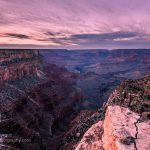
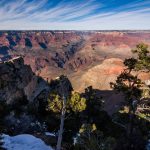
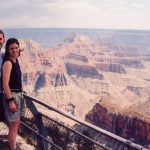
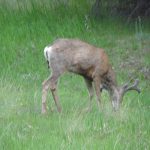
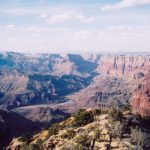
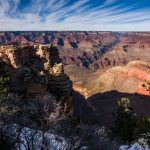
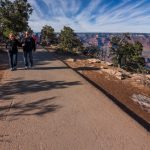
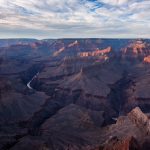
No Comments Yet